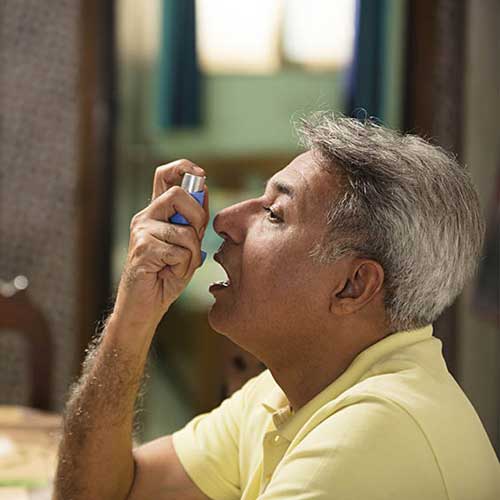Pulmonology Professor on Asthma allergy in Elders
Among the Pulmonary diseases in elderly ; allergy and asthma occur just as frequently as in young adults.But it is seen in Asthma Allergy Centre Thrissur Kerala that many Geriatric Asthmatics from Thrissur, Ernakulam, Kochi , Palakkad, Malappuram ,and Kozhikode are already wrongly labelled as COPD even when they are nonsmokers all their life.
pulmonary symptoms in Asthma and Allergy often begin slowly as a persistent cough and intermittent shortness of breath and often worsen over time. In fact, more than half the asthma patients are currently over age 65.
Over the past 10 years, Pulmonary research has indicated that allergic asthma in the elderly is generally under-diagnosed and under-treated, leading to a diminished quality of life and higher morbidity and mortality than those without asthma.
The differential diagnosis should include other Pulmonology diseases with allergic asthma-like symptoms such as aspiration syndromes, GE reflux disease, cardiac disease, pulmonary embolism, primary and secondary lung cancer, drug-induced asthma symptoms and chronic obstructive pulmonary disease (COPD).
Allergic Asthma’s unique mechanism of mast cell mediator release results in eosinophils in tissues and sputum, thickening of the mucous membrane, and bronchial muscle hypertrophy. These characteristics typify asthma, unlike those of COPD.
Further, allergic asthma patients usually show a significant degree of reversibility of airway obstruction with the use of bronchodilators and/or corticosteroids. Allergic Asthma symptoms may be mimicked by pulmonary Diseases like COPD and the diagnosis can be overlooked.
Symptoms of asthma in the elderly
Allergic Asthma symptoms may present with coughing, at times associated with clear mucous production. These patients often have no prior history of asthma.
Coughing is among the most common symptoms, while wheezing may or may not be present. Allergic Asthmatic coughing is usually associated with clear sputum production, which should be differentiated from chronic bronchitis. Finding eosinophils in the sputum is supportive of the diagnosis of asthma.
The onset of symptoms may be slow and are often long-lasting. Further, certain infections—such as influenza—put the patient at risk for a severe flare of asthma with a significant risk for complications and higher mortality.




Leave a Reply